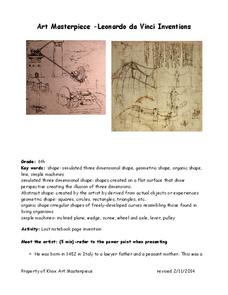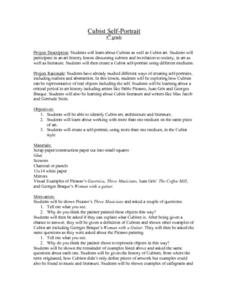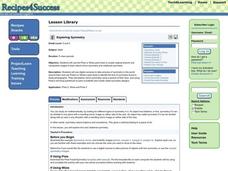Curated OER
Symmetry with Shapes
Students analyze a symmetrical stamp design with an equal balance of light and dark to create a pattern in succession. In this shape design lesson, students review concepts of sign, symbol and language across cultures. Students analyze...
Exploratorium
Touch the Spring
Concave mirrors and the images they produce are traditional topics in the physics classroom. This resource explains how to set up an investigation of them, and it provides you with the explanation of concepts.
Curated OER
Interpreting Lao Design: Painting
Students examine Lao art techniques and practice replication and modification of Lao designs. Maintaining a symmetrical image, they embellish designs with imagery and background color. They discuss the students' works and note the...
Sargent Art
Warhol-like Color Study
The lithographs of pop artist Andy Warhol inspire a lesson that asks young artists to try their hand at creating a study that demonstrates the effect color has on design. After drawing a self-portrait, participants paint their image in...
Mr. E. Science
Light
Where does bad light end up? In a prism! The presentation covers light, mirrors, lenses, and the structure of the eye. It also provides explanations of reflection, refraction, concave and convex mirrors and lenses, and a comparison of...
Chandler Unified School District
Art Masterpiece—Leonardo da Vinci Inventions
After getting to know the inventor, Leonardo da Vinci and his many inventions, scholars think up their own invention. Following a written description and a hand-drawn picture, learners use a method of mirror writing and antiquing to give...
Curated OER
Mirror Trees
In this painting activity, students fold a card in half and following the instructions, paint a tree and its mirror image. There are no visual clues on the page; students read each step to follow. This page is from Northern Ireland.
Curated OER
Pop Art Ice Cream Painting
Students develop skills in painting and create a painting of an ice cream cone using Pop Art as in inspiration.
Curated OER
Finger Painting and Feather Painting with Nature
Students explore finger painting and painting with feathers and recreate the look of objects in nature. They read the book, 'It Looked Like Spilt Milk,' create a shaving cream print, paint with feathers, and construct a mirror image on...
Dick Blick Art Materials
Have a Ball!
M.C. Escher's "Hand with Reflecting Globe" and the work of Dick Termes, inspire this activity. Kids check out their reflection in a Christmas ornament or a bubble filter and recreate this distorted image on a vinyl ball.
Curated OER
Spherical Mirrors
Students view images in a spherical mirror and interpret the path of light. In this physics lesson, students view a large spherical mirror demonstrated by the instructor. They use shiny serving spoons to investigate the path of light on...
Curated OER
Look in the Mythic Mirror: I've Got Rhythm!
Learners explore the relationships between music, poetry, and visual art. Using the story of Orpheus and Eurydice, pupils develop an awareness of the compositional elements of the Classical style, and the aesthetic effects of those...
Tayasui.com
Drawing with Carl
Who is Carl? Carl is a little monster that will help your learners draw and create in any way imaginable. Get those kids to activate creative and imaginative thinking skills with a really fun app. There are endless options that can...
Sargent Art
Facial Proportion Challenge: Freaky Faces
Young artists have fun making freaky faces when they accept the challenge of making proportional portraits. They must find pictures in magazines, cut out two eyes, a nose, and a mouth, and then rescale these images into a portrait.
Curated OER
Pop Art Ice Cream Painting
Students create paintings of ice cream treats using Pop Art as an inspiration while developing skills in painting in this 4th through 6th grade Art lesson. Included with the lesson are possible extensions and suggested evaluation rubric.
Curated OER
Breaking News English: New Computer Art Mirrors Viewer's Mood
In this English instructional activity, students read "New Computer Art Mirrors Viewer's Mood," and then respond to 47 fill in the blank, 7 short answer, 20 matching, and 8 true or false questions about the selection.
Curated OER
Painting Pictures with Poetry
Students develop their own smilies and metaphors. They examine writing of the Poet Laureate. They identify philanthropy in quotations of others.
Curated OER
Rock Art Caves
Fourth graders research the rock art caves that are found in Texas. In this rock art lesson, 4th graders use assigned web sites to find information about the rock art that is found in caves in Texas. They work in small groups to make a...
Curated OER
Cubist Self-Portrait
Study Cubism and Cubist art by examining a number of images with your students. They look at the relationship of Cubism to society architecture, and literature. Finally, they design a Cubist self-portrait using a variety of mediums after...
Curated OER
Les Grands Artistes de Mme Michele
Students become familiar with Picasso's art through viewing his paintings. They create their own Picasso-like paintings of each of the following types: person, person with hat, conversation between two people, mirror (reveresed), and...
Curated OER
Exploring Symmetry
Students use a software program to create artwork and to manipulate images to study mirror and rotational symmetry. They take pictures of items in their environment in which they identify symmetry.
Curated OER
The Looking Glass
Sixth graders investigate the intention behind artists' works and contemplate the notion that art mirrors life. They respond orally and in writing to a painting and recognize that seeing the whole picture can offer a different ...
Curated OER
What's Right and Wrong? Moral Messages in Art
Students explore the Steen and Mount paintings and their presentation of moral issues. They discuss ethical debates in society today and write a short position paper on an issue raised by the paintings or in the discussion. They make a...
Curated OER
Anamorphosis
Pupils classify optical illusions according to their distinguishing characteristics. They create anamorphic art and use Mylar flexible mirrors to view and then they describe and analyze the optical illusion.

























